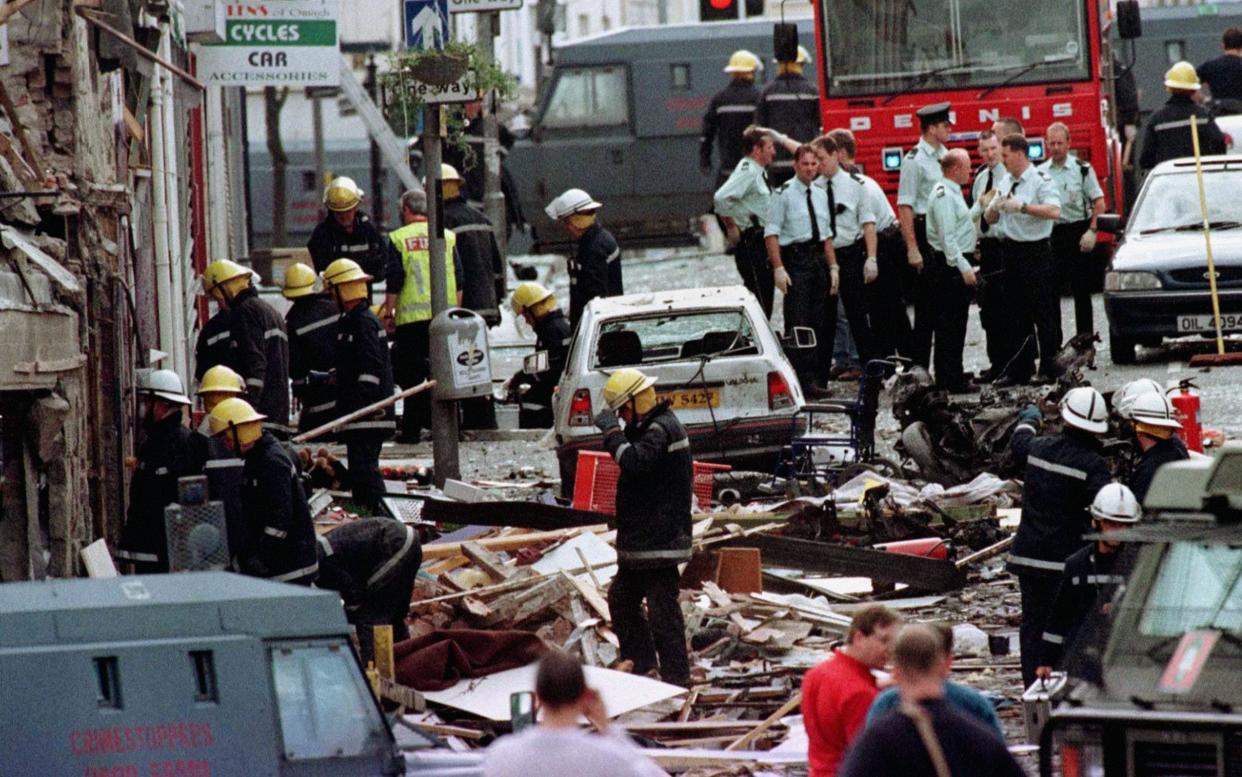Omagh bombing may have been preventable, judge rules

The Omagh bombing may have been prevented by the security forces, a judge ruled as he ordered the Government to conduct an investigation.
The atrocity – the single worst incident in the history of the Troubles – claimed the lives of 29 people, including a pregnant woman with twins, when a bomb detonated by the real IRA ripped through the centre of Omagh on a busy Saturday afternoon in August 1998. Eleven of the victims were children.
On Friday, a judge in the High Court in Belfast recommended that the UK Government must now hold an inquiry into the circumstances surrounding the attack, including any missed opportunities to have stopped it happening.
Delivering judgment in a legal challenge against the UK Government's refusal to hold a public inquiry, Mr Justice Horner said: "I am satisfied that certain grounds when considered separately or together give rise to plausible allegations that there was a real prospect of preventing the Omagh bombing."
He said that the grounds included "the consideration of terrorist activity on both sides of the border by prominent dissident terrorist republicans leading up to the Omagh bomb".

Mr Justice Horner added: "Any investigation will have to look specifically at the issue of whether a more proactive campaign of disruption, especially if co-ordinated north and south of the border, had a real prospect of preventing the Omagh bombing."
The judge said a probe was necessary to comply with human rights laws on the need for a thorough investigation but stopped short of insisting on a public inquiry.
His full open judgement will be handed down at a later date because the legal official required to check the document before it is made public was self-isolating with Covid.
The judicial review into Westminster's refusal to hold an inquiry was launched eight years ago by Michael Gallagher, whose son Aiden, 21, was killed in the explosion.
On Friday, he praised the long-awaited judgment, saying: "We feel vindicated – this has been a great day for the families. We just hope that both the British and Irish governments, as the judge has recommended, will look at these issues and move them forward very quickly.
"We knew from really over 20 years that this was a preventable atrocity, but it's one thing for me to say it, it's an entirely different thing for a senior High Court judge to [say]. I just felt sadness on one side and relief on the other that, you know, we got it right and people have looked at this and believed us."
The UK Government said it would take time to consider the judgment, while Micheal Martin, the Irish premier, said his government would examine all the options and would do what is "necessary" to uphold citizens' rights.

John Fox, a solicitor for the Omagh families involved in the case, said: "It is quite a harrowing finding some 23 years since the bomb, something which the families have been campaigning for a significant length of time. They're vindicated in that campaign with the finding of a senior High Court judge that supports their argument."
The lawyer said the fact that any future probe would have to examine national security material of a highly sensitive nature meant a public inquiry was the only option.
In the legal case, Mr Gallagher claimed intelligence from British security agents and Royal Ulster Constabulary officers could have been drawn together to prevent the dissident republican bombing.
On August 4 1998, 11 days before the attack, the RUC received an anonymous telephone call warning there would be an "unspecified" terrorist attack on police in Omagh on August 15, the day the attack happened.
The force's Special Branch, which handled intelligence from agents, took limited action on the information, an investigation by former police ombudsman Baroness Nuala O'Loan found.
Responding to the judgment, Brandon Lewis, the Northern Ireland Secretary, said: "I want to put on record my deep regret that the families of those killed and wounded have had to wait so long to find out what happened on that terrible day in 1998. They deserve answers, and I have great respect for their patience, grace and determination.
"We recognise that today the court has set out that there are 'plausible allegations that there was a real prospect of preventing the Omagh bombing' and that more should be done to investigate this."

